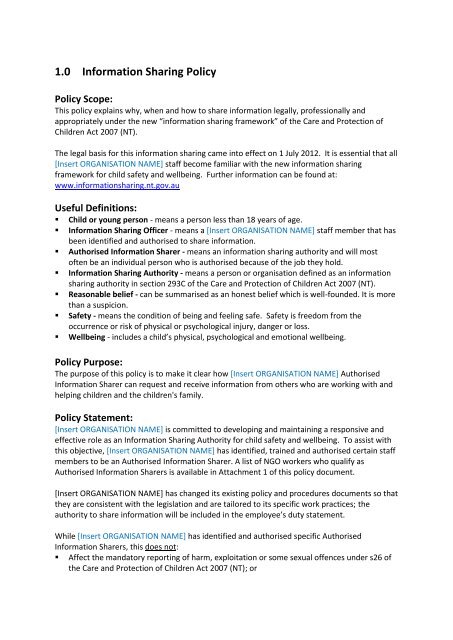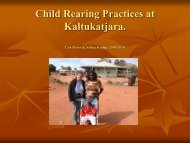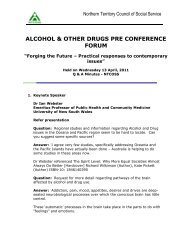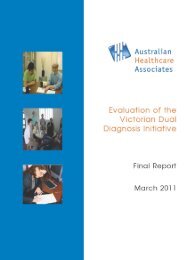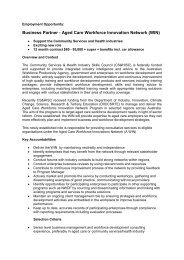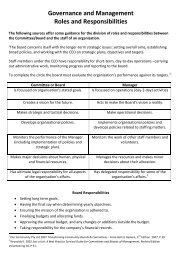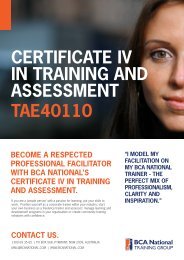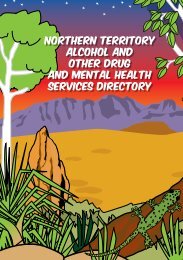1.0 Information Sharing Policy - Northern Territory Council of Social ...
1.0 Information Sharing Policy - Northern Territory Council of Social ...
1.0 Information Sharing Policy - Northern Territory Council of Social ...
Create successful ePaper yourself
Turn your PDF publications into a flip-book with our unique Google optimized e-Paper software.
<strong>1.0</strong> <strong>Information</strong> <strong>Sharing</strong> <strong>Policy</strong><br />
<strong>Policy</strong> Scope:<br />
This policy explains why, when and how to share information legally, pr<strong>of</strong>essionally and<br />
appropriately under the new “information sharing framework” <strong>of</strong> the Care and Protection <strong>of</strong><br />
Children Act 2007 (NT).<br />
The legal basis for this information sharing came into effect on 1 July 2012. It is essential that all<br />
[Insert ORGANISATION NAME] staff become familiar with the new information sharing<br />
framework for child safety and wellbeing. Further information can be found at:<br />
www.informationsharing.nt.gov.au<br />
Useful Definitions:<br />
• Child or young person - means a person less than 18 years <strong>of</strong> age.<br />
• <strong>Information</strong> <strong>Sharing</strong> Officer - means a [Insert ORGANISATION NAME] staff member that has<br />
been identified and authorised to share information.<br />
• Authorised <strong>Information</strong> Sharer - means an information sharing authority and will most<br />
<strong>of</strong>ten be an individual person who is authorised because <strong>of</strong> the job they hold.<br />
• <strong>Information</strong> <strong>Sharing</strong> Authority - means a person or organisation defined as an information<br />
sharing authority in section 293C <strong>of</strong> the Care and Protection <strong>of</strong> Children Act 2007 (NT).<br />
• Reasonable belief - can be summarised as an honest belief which is well-founded. It is more<br />
than a suspicion.<br />
• Safety - means the condition <strong>of</strong> being and feeling safe. Safety is freedom from the<br />
occurrence or risk <strong>of</strong> physical or psychological injury, danger or loss.<br />
• Wellbeing - includes a child’s physical, psychological and emotional wellbeing.<br />
<strong>Policy</strong> Purpose:<br />
The purpose <strong>of</strong> this policy is to make it clear how [Insert ORGANISATION NAME] Authorised<br />
<strong>Information</strong> Sharer can request and receive information from others who are working with and<br />
helping children and the children's family.<br />
<strong>Policy</strong> Statement:<br />
[Insert ORGANISATION NAME] is committed to developing and maintaining a responsive and<br />
effective role as an <strong>Information</strong> <strong>Sharing</strong> Authority for child safety and wellbeing. To assist with<br />
this objective, [Insert ORGANISATION NAME] has identified, trained and authorised certain staff<br />
members to be an Authorised <strong>Information</strong> Sharer. A list <strong>of</strong> NGO workers who qualify as<br />
Authorised <strong>Information</strong> Sharers is available in Attachment 1 <strong>of</strong> this policy document.<br />
[Insert ORGANISATION NAME] has changed its existing policy and procedures documents so that<br />
they are consistent with the legislation and are tailored to its specific work practices; the<br />
authority to share information will be included in the employee’s duty statement.<br />
While [Insert ORGANISATION NAME] has identified and authorised specific Authorised<br />
<strong>Information</strong> Sharers, this does not:<br />
• Affect the mandatory reporting <strong>of</strong> harm, exploitation or some sexual <strong>of</strong>fences under s26 <strong>of</strong><br />
the Care and Protection <strong>of</strong> Children Act 2007 (NT); or
• Affect the provisions <strong>of</strong> the Act which allow an Authorised Officer or the Children’s<br />
Commissioner to seek information as part <strong>of</strong> an Inquiry or Investigation into a situation<br />
where a report or complaint has been received that raises concerns for a child’s safety or<br />
wellbeing; or<br />
• Require a person or an organisation to take any step which is not in accordance with the<br />
Care and Protection <strong>of</strong> Children Act 2007 (NT).<br />
Under this new framework, [Insert ORGANISATION NAME] Authorised <strong>Information</strong> Sharers need<br />
to confirm before sharing information that they are sharing information only with other<br />
Authorised <strong>Information</strong> Sharers. A list <strong>of</strong> accepted authorised information sharers is provided in<br />
Attachment 2 <strong>of</strong> this policy document.<br />
<strong>Policy</strong> Principles:<br />
• [Insert ORGANISATION NAME] Authorised <strong>Information</strong> Sharers should provide and receive<br />
information to assist their organisation in working in child safety and wellbeing related<br />
tasks;<br />
• Personal information should be managed with sensitivity and discretion, recognising that<br />
the wellbeing <strong>of</strong> a child includes respect for their personal integrity and dignity, and that <strong>of</strong><br />
their family, and involves, particularly for older children, having control over their personal<br />
information wherever possible;<br />
• [Insert ORGANISATION NAME] Authorised <strong>Information</strong> Sharers are to work collaboratively to<br />
ensure child safety and wellbeing and to respond to legitimate information sharing requests<br />
in a timely fashion;<br />
• Rules and standards to protect confidentiality and privacy <strong>of</strong> individuals should not obstruct<br />
the sharing <strong>of</strong> information for the safety and wellbeing <strong>of</strong> children;<br />
• [Insert ORGANISATION NAME] Authorised <strong>Information</strong> Sharers need to consider what<br />
factors should be taken into account in the formation <strong>of</strong> a “reasonable belief” for the<br />
purposes <strong>of</strong> the information sharing framework; and<br />
• [Insert ORGANISATION NAME] Authorised <strong>Information</strong> Sharers should identify when<br />
consideration needs to be given to obtaining consent from the relevant parties before<br />
sharing information under the information sharing framework. Authorised <strong>Information</strong><br />
Sharers are not legally required to obtain consent to share information under the<br />
information sharing framework.<br />
• Team Leaders or CEOs should review the implementation <strong>of</strong> the policy and procedures in<br />
team meetings or individual supervision session to ensure information is shared<br />
appropriately and in line with the information sharing guidelines and the legislation and its<br />
intent.<br />
Procedures and Practices:<br />
There are five main procedures that make up the information sharing framework and should be<br />
followed by [Insert ORGANISATION NAME] Authorised <strong>Information</strong> Sharers. These are:<br />
1. <strong>Information</strong> <strong>Sharing</strong><br />
As an Authorised <strong>Information</strong> Sharer you may decide to share information with another<br />
Authorised <strong>Information</strong> Sharer at your own instigation, i.e. when no request has been made, as<br />
long as you:
• Specify the child or children to whom the information relates when sharing the information.<br />
• Have a reasonable belief that the information would help the recipient take a specified<br />
action in relation to the child or children. Such as conduct an investigation, make a decision<br />
or provide a service to enable informed case management practices.<br />
In this circumstance, as an Authorised <strong>Information</strong> Sharer, you should:<br />
• Determine and use the most appropriate method <strong>of</strong> communication on a case by case basis<br />
– information can be shared verbally, by email or in writing.<br />
• Ensure all exchanges <strong>of</strong> information, made under the information <strong>Sharing</strong> Framework, are<br />
recorded in the Client File – in accordance with the Record Keeping and Documentation<br />
procedure described below (refer procedure 5).<br />
2. How to request information<br />
As an Authorised <strong>Information</strong> Sharer, you should:<br />
• Determine the information you wish to collect and clearly identify the child or group <strong>of</strong><br />
children about whom you wish to collect the information.<br />
• Review the Client File to check you are not asking partner agencies to prepare and provide<br />
duplicate information.<br />
• Determine which person you wish to request the information from.<br />
• Determine if the person is an <strong>Information</strong> <strong>Sharing</strong> Authority.<br />
• Identify the reasons why you need the information (i.e. assessment, case planning, service<br />
provision, or to initiate or conduct an investigation).<br />
• Check whether the person or organisation providing the information has obtained consent<br />
from the relevant parties before sharing information. Best practice is to seek consent<br />
before information is exchanged, provided that doing so will not impact negatively upon the<br />
child’s safety or wellbeing or an investigation in relation to a child.<br />
• Ensure seeking consent does not jeopardise the safety or wellbeing <strong>of</strong> any other person<br />
including a person in your workplace or employee <strong>of</strong> another organisation.<br />
• Indicate the time period for the information being sought (e.g. for the last six months, last<br />
three years).<br />
• Provide a realistic timeframe to the Authorised <strong>Information</strong> Sharer for the requested<br />
information. Communicating/negotiating a due date is best practice as it promotes<br />
collaboration and can ensure urgent matters are prioritised.<br />
• Determine and use the most appropriate method <strong>of</strong> communication on a case by case basis<br />
– information can be shared verbally, by email or in writing.<br />
• Ensure all exchanges <strong>of</strong> information, made under the <strong>Information</strong> <strong>Sharing</strong> Framework, are<br />
recorded in the Client File – in accordance with the Record Keeping and Documentation<br />
procedure described below (refer procedure 5).<br />
3. How to provide information<br />
As an Authorised <strong>Information</strong> Sharer, you should:<br />
• If receiving a request for information, determine if the person or organisation requesting the<br />
information is an information sharing authority. If this person is unknown to you, you can<br />
ask them to put their request into an email, which will confirm the organisation they are<br />
working for. If you are still not clear, then you can contact the agency by phone and ask for<br />
verification <strong>of</strong> employment and confirmation <strong>of</strong> the organisation that this person is an<br />
information sharing authority.
• Determine if information requested is appropriate to share and relevant to the child’s safety<br />
and wellbeing.<br />
• Determine that you reasonably believe that the sharing <strong>of</strong> this information will not endanger<br />
the child or another person’s life or physical safety<br />
• Consider what the requested information will be used for (i.e. assessment, case planning,<br />
service provision, or to initiate an investigation). This will assist you to determine the<br />
relevant information to share.<br />
• Consider obtaining consent from the child and/or family members before sharing<br />
information. Best practice is to seek consent before information is exchanged, provided that<br />
doing so will not impact negatively upon the child’s safety or wellbeing or an investigation in<br />
relation to a child.<br />
• Determine and use the most appropriate method <strong>of</strong> communication on a case by case basis<br />
– information can be shared verbally, by email or in writing.<br />
• Ensure all exchanges <strong>of</strong> information, made under the information <strong>Sharing</strong> Framework, are<br />
recorded in the Client File – in accordance with the Record Keeping and Documentation<br />
procedure described below (refer procedure 5).<br />
4. When and how to refuse to share information<br />
As an Authorised <strong>Information</strong> Sharer you may refuse to share information:<br />
• When the person making the request is not an Authorised <strong>Information</strong> Sharer.<br />
• When the information requested is not relevant to the child safety or wellbeing <strong>of</strong> the child<br />
in question.<br />
• When the request is not in relation to a specified child or children.<br />
• When you reasonably believe that sharing the information might:<br />
◦ Endanger a person’s life or physical safety;<br />
◦ Prejudice the investigation <strong>of</strong> a crime or other illegal activity;<br />
◦ Prejudice a Coronial inquest or inquiry;<br />
◦ Prejudice court or tribunal proceedings;<br />
◦ Breach legal pr<strong>of</strong>essional privilege or client legal privilege;<br />
◦ Enable the identification <strong>of</strong> a confidential source related to the enforcement or<br />
administration <strong>of</strong> a law; or<br />
◦ Prejudice the effectiveness <strong>of</strong> a method or procedure for detecting, preventing or<br />
investigating criminal or illegal activity.<br />
In this circumstance, as an Authorised <strong>Information</strong> Sharer, you should:<br />
• Notify the person making the request <strong>of</strong> the decision to refuse to share information and,<br />
where safe, you can advise them <strong>of</strong> the reasons why.<br />
• All refusals to share information have to be in writing.<br />
• Ensure all exchanges <strong>of</strong> information, made under the <strong>Information</strong> <strong>Sharing</strong> Framework, are<br />
recorded in the Client File – in accordance with the Record Keeping and Documentation<br />
procedure described below (refer procedure 5).<br />
5. Record Keeping and Documentation<br />
It is best practice to record all exchanges (including refusals) <strong>of</strong> information made under the<br />
information sharing framework in the Client File which might be as hard copy or as an electronic<br />
record. .<br />
• Documentation should cover:<br />
◦ <strong>Information</strong> requests received;<br />
◦ <strong>Information</strong> requests made;
◦ <strong>Information</strong> that has been shared; and<br />
◦ <strong>Information</strong> requests that have been refused, together with the reasons for refusal.<br />
• <strong>Information</strong> shared under the information <strong>Sharing</strong> Framework remains confidential<br />
information. It is an <strong>of</strong>fence to use or disclose such information for a purpose not related to<br />
the safety or wellbeing <strong>of</strong> a child to whom the information relates, unless otherwise<br />
authorised by law (for example, a request for information by the Children’s Commissioner).<br />
• <strong>Information</strong> should be requested and provided in a secure way so that it is seen only by<br />
those who need to be aware <strong>of</strong> it. The usual privacy considerations under the <strong>Northern</strong><br />
<strong>Territory</strong> <strong>Information</strong> Act (2002) apply.<br />
6. Complaints procedure<br />
If your request for information has been refused and you disagree with the position you should go<br />
through your line manager. The line manager should liaise with the other <strong>Information</strong> <strong>Sharing</strong><br />
Authority in question, preferably with a person at the same level. If no agreement is reached the<br />
matter should be referred to the <strong>Information</strong> <strong>Sharing</strong> Unit at DCF. (Tel: 1800 288 424)<br />
Documents related to this policy<br />
Related policies<br />
Standards or other references:<br />
Legislation or other requirements:<br />
Forms, record keeping or other<br />
documentation requirements:<br />
[List any related policies]<br />
Example: Privacy and Confidentiality <strong>Policy</strong><br />
[List any related standards or references]<br />
Example: <strong>Information</strong> <strong>Sharing</strong> Administrative Guidelines – 1 July 2012<br />
viewed at www.informationsharing.nt.gov.au<br />
[List any related Legislation or other requirements]<br />
Example: Care and Protection <strong>of</strong> Children Act 2007 (NT), Privacy Act<br />
(1988) and associated amendments and the <strong>Northern</strong> <strong>Territory</strong><br />
<strong>Information</strong> Act (2002).<br />
[List related forms, documents or records]
[Insert ORGANISATION NAME]<br />
Attachment 1<br />
Name <strong>of</strong> Authorised <strong>Information</strong> Sharer<br />
Date<br />
authorised<br />
Authorised<br />
by<br />
Next review<br />
date<br />
Employment<br />
discontinued
[Insert ORGANISATION NAME]<br />
Attachment 2<br />
Authorised information sharers include:<br />
• Carers operating under the Care and Protection <strong>of</strong> Children Act 2007 (NT);<br />
• Police <strong>of</strong>ficers;<br />
• School principals;<br />
• Registered or authorised teachers;<br />
• A provider <strong>of</strong> registered child care services;<br />
• Individuals in charge <strong>of</strong> non-government organisations (NGOs) who provide a service in<br />
connection with children;<br />
• Individuals employed by the above organisations to provide a service or perform a function<br />
for or in connection with children;<br />
• A provider <strong>of</strong> disability or mental health services<br />
• A Provider <strong>of</strong> Alcohol and Other Drug Services<br />
• Case managers working with children in the youth justice system;<br />
• Doctors, nurses, psychologists, and other health pr<strong>of</strong>essionals registered under the Health<br />
Practitioner Regulation National Law to practise a health pr<strong>of</strong>ession (other than students);<br />
• Persons in charge <strong>of</strong> public or private hospitals;<br />
• Public servants, including CEOs <strong>of</strong> government agencies, who are acting under a law <strong>of</strong> the<br />
<strong>Northern</strong> <strong>Territory</strong> in relation to children, including for example: Department <strong>of</strong> Children<br />
and Families (DCF) authorised <strong>of</strong>ficers under the Care and Protection <strong>of</strong> Children Act and<br />
corrections <strong>of</strong>ficers and others acting under the Youth Justice Act; and<br />
• Lawyers.<br />
It is the responsibility <strong>of</strong> each authorised information sharer to satisfy themselves that they are<br />
authorised under the Act to share information in relation to a child or children and that anyone<br />
who they propose to share information with is also authorised.


